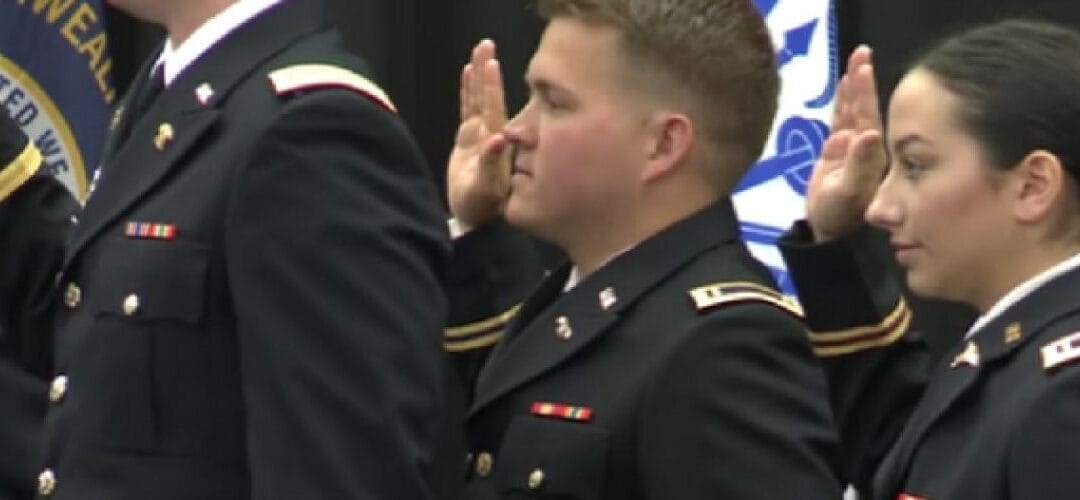(Photo by University of Louisville Army ROTC)
By Paul Culp, MA (Oxon.), CFT, GCDF, CCSP
You owe it to yourself, if you haven’t already had the experience, to see the 1955 play and 1958 movie No Time for Sergeants, which launched Andy Griffith to stardom on the screen. Griffith’s character, the good-natured but freakishly backward Will Stockdale, finds military life a learning experience in almost every way, and one of the early revelations is that ROTC is not some sort of disease:
http://https://youtu.be/yyOI3Prkh8M?t=4m51s
Far from being an illness, ROTC can be one of the healthiest things you ever do, especially if you do it with a full scholarship. If you don’t mind owing Uncle Sam a few years of service after graduation, the ROTC scholarship offers one of the most powerful financial aid packages available anywhere, and those few years as an officer can be a big help in the job market afterwards. If you want to make the military a career, so much the better.
How ROTC works:
The Reserve Officers’ Training Corps was established under the National Defense Act of 1916, which provided for nationally standardized officer training for college students at a time when the only routes to an officer’s commission typically had been graduation from a service academy or military college, or promotion under combat conditions. The Army, Air Force, and Navy all have programs, with Navy ROTC also training those students who want to be Marine Corps officers. Participation in Junior ROTC at the high school level is desirable but not necessary.
Acceptance into an ROTC program is no guarantee of a scholarship, but ROTC scholarships have few equals as financial aid vehicles. Benefits include tuition, fees, books, and a monthly stipend for personal expenses. ROTC scholarship recipients also continue to be eligible for many other forms of financial aid.
ROTC students take their military courses and training–which includes obligatory summer adventures of various kinds–along with the normal course-work leading to whatever degrees they have chosen to pursue, but the services will have some say regarding majors and course selection. The Navy and Air Force particularly emphasize STEM courses and foreign languages.
Should an ROTC scholar decide to leave the program after freshman year, there is no further obligation, but continued participation does incur a service obligation. Holders of Army ROTC scholarships must serve four years of active duty and four in the reserves. The Navy and Marine requirements vary by specialty but are normally four to five years of active duty, and as much as 10 years for aviators. The Air Force requires four to six years of active duty, and up to 10 years for aviators. Army and Air Force ROTC graduates are commissioned as second lieutenants, as are Navy graduates who enter the Marine Corps, while Navy officers begin at the same level, as ensigns.
No, it isn’t West Point or Annapolis or the USAFA, but…
While ROTC as a route to a commission is considerably less prestigious than training at one of the service academies, the overwhelming majority of today’s officers come from ROTC and Officer Candidate School programs (OCS being something more akin to a boot camp scenario) instead of the academies. Non-academy graduates now attain high rank in greater numbers than was formerly the case, and those who graduate and are commissioned earlier in the year than academy graduates enjoy the occasional advantages that can accompany date of rank.
A 2015 Washington Post op-ed hostile to the academies suggested that they be abolished on the grounds that ROTC and OCS are cheaper for the taxpayers and produce officers who have had a broader experience of life, other people, and academic subjects. We at The Coaching Educator do not take a position on this, and we are always honored to help students pursue academy appointments (and we are quite accomplished at it), but unquestionably ROTC scholarships are less scarce, and they offer the opportunity to live a more “normal” collegiate life while pursuing their degrees.
Who makes the ROTC scholarship grade and how:
Though the services differ somewhat in their requirements, holders of ROTC scholarships must be U.S. citizens and high school graduates of at least 17 years of age who have met GPA and SAT/ACT requirements as well as physical fitness and health standards. Extracurricular activities, especially those involving leadership, are crucial, and the ability to interview well can be decisive. Application deadlines vary, but the latter part of the junior year of high school is recommended as the time to begin. Students may initiate the process online or by visiting a military recruiting office.
As one might expect, the competition for ROTC scholarships is considerable. Entry-level military officers can expect far better salaries than recent graduates in most other fields, with unequaled additional benefits such as health care, relocation assistance, and shopping discounts in military exchange stores. The leadership training carries over into almost any non-military profession as well as providing the necessary skills for a permanent military career, and the attractions are considerable for students who appreciate a challenge and who desire some structure. The prospect of Uncle Sam footing the bill for it all creates an atmosphere in which the proven go-getters prevail.
The Coaching Educator has a strong track record of successfully guiding students through the process of exploring and exercising their ROTC scholarship options. We’ve helped numerous clients identify and choose the most suitable branch of the service and the optimal college, and we provide hands-on assistance at every step in the process, from high school course selection to choice of major to application forms to interview preparation.To learn more about our philosophy and capabilities, be sure to watch our free webinars, listen to our podcasts, sign up for our four-week College App Boot Camp, consider our Ultimate Programs and our special services for athletes and performing-arts students, and book a consultation to hear what we can do for you and how we do it. Keep reading this blog, and look for us on social media (see links below) as we keep our clients and admirers advised of new developments in our effort to help students get into and succeed at the right school.
Paul Culp is certified as a global career development facilitator and writes about college admissions, college costs, financial aid, and college life in general for The Coaching Educator team. A former journalist and corporate ghostwriter who now operates Shenandoah Proofreading, Editing & Composition Services (SPECS), he has also been a humanities teacher at all levels from university down to sixth grade. Paul has degrees from Oxford University, Jacksonville State University, and Samford University, and also is certified as a fitness trainer.
Recommended Reading About College Admissions
Culp, Paul. “The Basics of Applying for the Service Academies,” The Coaching Educator, 13 February 2019, http://tce.local/2019/02/13/the-basics-of-applying-for-the-service-academies/
Culp, Paul. “Cleaning Up Well: Appearance, Speech, and Demeanor at College Interview Time,” The Coaching Educator, 7 June 2018, http://tce.local/2018/06/07/cleaning-up-well-appearance-speech-and-demeanor-at-college-interview-time/
Culp, Paul. “The Ensign’s Tale: We Talk to a Recent Academy Graduate,” The Coaching Educator, 10 July 2018, http://tce.local/2018/07/10/the-ensigns-tale-we-talk-to-a-recent-academy-graduate/
Culp, Paul. “The Five Service Academies: A Brief Overview,” The Coaching Educator, 25 September 2018, http://tce.local/2018/09/25/the-five-service-academies-a-brief-overview/

